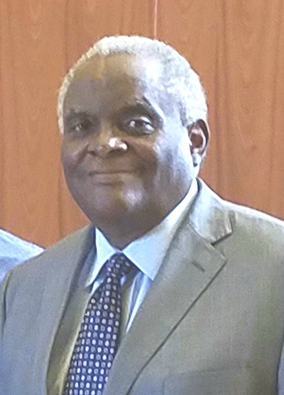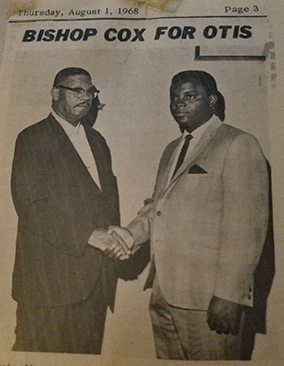‘African-Americans supported each other’
September 10, 2017 by Las Vegas Black Image Magazine
Filed under Conversation
QUESTIONS & ANSWERS | OTIS HARRIS
Otis Harris has lived through and witnessed so much change in Las Vegas.
He arrived here as a child in 1943, after his father learned that he could earn much more in Las Vegas than in their Texas hometown. They were part of a wave of black migration to the Silver State during the first half of the 20th century, when people from all over America were lured with the promise of good-paying jobs in a land of plenty.
Today, Harris is Chairman/CEO of Unibex Global Corporation, and he has a deep understanding of how African-Americans in Nevada can regain economic power and a sense of unity that many feel has been lost. We sat with him for a candid discussion, drawing on his unique historical perspective on race relations and his current work for financial empowerment.
How do race relations in Las Vegas today compare to the 1950s and 1960s?
Las Vegas was a segregated community when I first arrived in 1943 — but it wasn’t a hostile community. It was not like a plantation. There were people of color who lived downtown and owned property. Lubertha Johnson and her family owned a ranch in Paradise Valley, where McCarran Airport is today. She would have big picnics, and many people from the black community would gather there and have a great time. There were families such as the Hodges and Christensen families who owned land in the downtown areas and around the Clark County Courthouse. In the 1930s, many people got around Las Vegas with a horse and carriage — because few owned cars.
Why did the Historic Westside become the heartbeat of the black community?
I don’t really have the answer for that, but the heart of the Las Vegas Black Community was around Jackson Avenue in the Historic Westside Community. Where all the black churches stand today. Actually, there were Latinos who lived in the Historic Westside originally.
There are many debates over the pros and cons of segregation, but what are your feelings about the effects of segregation on the Las Vegas black community?
Las Vegas’ African-American residents supported each other and our businesses more when there was segregation. That is why I say integration was somewhat detrimental to the black community. During segregation, we shopped where we lived. We had about four black-owned grocery stores that were doing very well and surviving. There was a clothing store in the community, barbershops, nightclubs and casinos.
What made race relations hostile in Las Vegas?
I think when black people started to recognize that we wanted a better life, our expectations were communicated. We could see the better conditions for people who didn’t look like us had and we wanted a better life. When the demand for a better life became evident by the white establishment, a resistance was created — and an increase in segregation, along with discrimination, took hold. When the population of African-Americans in Las Vegas was small in the early days, the masses didn’t really worry about us. But as the black population grew and people started asking for more, that’s when the white establishment became hostile.
It seems that there was more unity in Las Vegas’ black community during that time.
Absolutely. As a matter of fact, the NAACP galvanized everyone in the black community whenever there was meeting. There would be one hundred to two hundred people at each meeting. Everyone was there — including our elite black community leaders.
What do you think caused the breakdown in Las Vegas’ black community?
Politics came into play. When people saw they could get paid by supporting … the politicians, they opted to give their loyalties to the political system and not to the wellbeing of the community. Non-profits were established within the impoverished Westside community to receive political “earmarked” dollars to operate — creating a status quo for the community to remain dilapidated to qualify for those dollars. My personal opinion is that some of these dollars never reached the community to make it better, but made a lot of politicians rich. I just want people to know that the Historic Westside community has minimum positive change not because of the people from that community, but it is by design. Many fight to maintain an appearance of poverty in the historic black community to continue receiving funds from the federal government. Today, discrimination based on race has transcended into an economic apartheid that I am committed to changing — by assisting black-owned businesses and the community with economic opportunities that the whole state of Nevada can be proud of.
For additional information, contact Otis Harris at (702) 646-7068.







